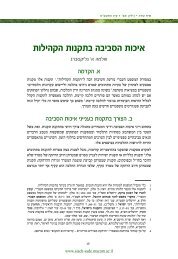ע - מכללת ליפשיץ - Macam
ע - מכללת ליפשיץ - Macam
ע - מכללת ליפשיץ - Macam
Create successful ePaper yourself
Turn your PDF publications into a flip-book with our unique Google optimized e-Paper software.
Abstracts<br />
VI<br />
as to reduce the two opinions to alternative formulations of the<br />
same view.<br />
In conclusion it should be pointed out that there is a general<br />
tendency to fix the halakhah in accordance with the authority who<br />
attempts to reduce differences of opinion to a minimum. This<br />
tendency constitutes a lesson that bears important moral and<br />
educational implications.<br />
Elyakim Krumbein<br />
Torah Lishmah: A Reappraisal<br />
In his article “Torah Lishmah: A Reappraisal”, Elyakim Krumbein<br />
aims to reopen a philosophical-educational issue which was<br />
thoroughly studied by Rabbi Dr. Norman Lamm in his 1972 book,<br />
“Torah Lishmah”. In early and late Jewish writings, the concept<br />
Torah Lishmah denotes the inner experience which characterizes<br />
the ideal Torah student. The present article seeks to define the<br />
nature of that experience. Lamm assumed that lishma deals with<br />
the conscious aim of the learner, for the sake of which he engages<br />
in Torah study. The writer believes that the learner’s inner<br />
existential motivation lies at the heart of the issue. Support is<br />
garnered for this position by reexamining sources that had been<br />
analyzed in the previous study. The writer’s approach is further<br />
bolstered by reference to modern psychology, which stresses the<br />
role played by the emotions in cognitive processes. The article<br />
notes the importance of this study in the context of Torah study in<br />
the modern world.
















